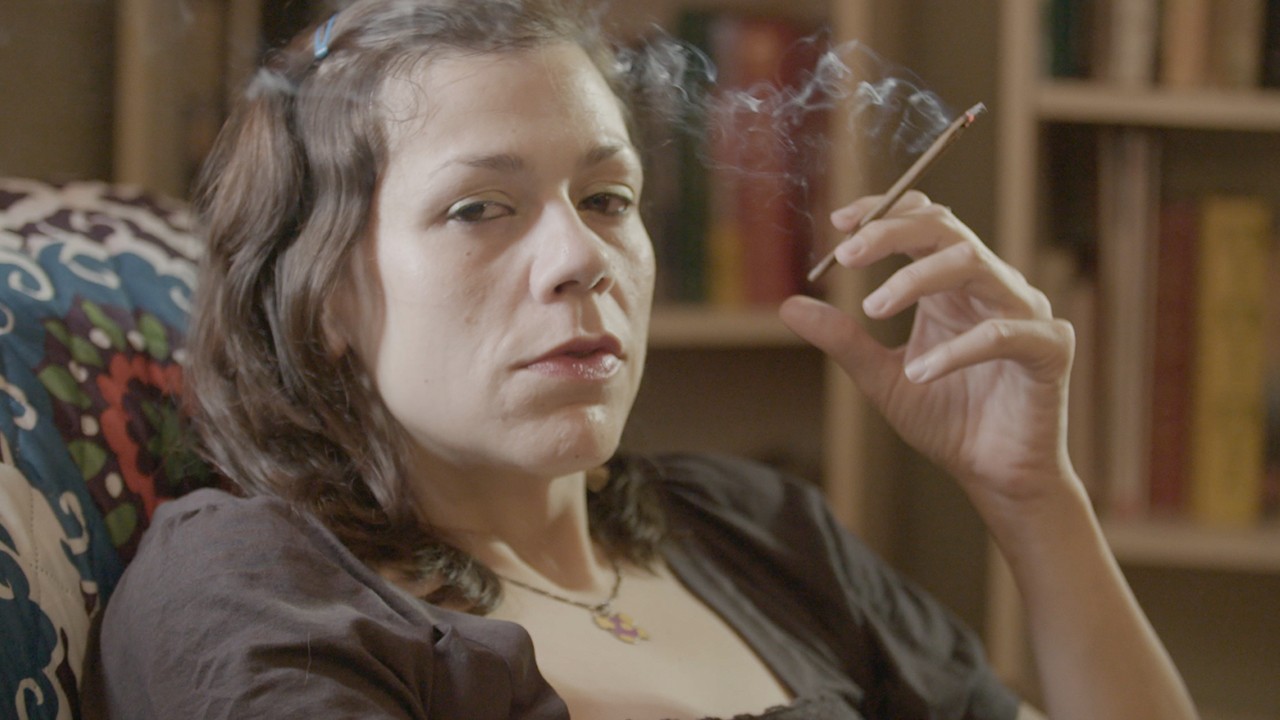A still from the trailer for "Kiki: Love to Love"
Get the VICE App on iOS and AndroidThe opening credits of Kiki: Love to Love are an exercise in playful eroticism. A couple is having sex, and intercut with their lovemaking are suggestive and explicit images: a needle being threaded, monkeys getting it on, a juicy fruit being squeezed open. Even when we linger on the couple, the montage keeps things PG—the chiseled young man writhes naked on the bed, but his privates are censored by an image of a turning corkscrew.It's a perfect introduction to Spanish director Paco León's third feature film, an anthology of five disconnected stories dealing with various kikis (Spanish slang for "what gets you off"), everything from polyamory and furry parties to harpaxophilia (arousal by robbery) and dacryphilia (arousal by tears).The film has been a critical and box office success in Spain, where it's the 15th highest grossing film of the year (and only the third non-Hollywood film on the list.) It's been compared to early work from Spanish Oscar-winning director Pedro Almodóvar, and even managed to outgross Almodóvar's latest. Then again, as León admits, when you include a golden shower scene in your film, critics and audiences in Spain cannot help but think back to the infamous golden shower (NSFW) from Almodóvar's first film.León spoke with VICE about the road to making Kiki, the lengths he went to make the film feel authentic, and the 1960s message he hopes it conveys.VICE: What kind of research did you engage in ahead of working on the film? There are a lot of outré fetishes portrayed here; I'm sure you wanted to learn more about those, no?
Paco León: You could say there was definitely some field work. Talking to people and hearing anecdotes from all around was helpful. I'm very curious, and it was all part of the process, talking to friends about these things. And then when we were writing the script for the film, there was a party in Madrid that was about everything sexual—fetishes, bondage, swingers, it had everything you could think of. It was the kind of party I had in mind for one of the sequences in the film. And I really wanted to go! I kept saying, "I just have to go!" I wanted to see it for myself, not just to see those who attended it, but to listen in on people's conversations, get a sense for the dialogue and the ambience, even the music that's played.But I'm a bit too famous here to just show up, so I went wearing a Mexican Lucha Libre mask, so I could enjoy the experience and see without being seen. It really was pretty great. The first thing I noticed was that people's conversations were very mundane. They were talking about homework and recipes and totally ordinary stuff. That was what was so endearing about it, and the most real. You can have this image of "perversion" in your mind, but these are just normal people who are into very specific things. And that's what I wanted to capture in the film, that mix of the lurid and the humane.And so much of it relies on your cast, who get to do quite a bit on screen. Can you talk a bit about your work with your actors?
Well, I was personally involved in the casting process. These are people I know, or if I didn't know them, people I wanted to work with. I already had some people in mind while I wrote the script. And then my own approach to filmmaking, which I've come to rely on, is that there's not really a set script. They never had dialogue printed out to memorize—there was a "screenplay" in the sense that my crew had costumes, sets and things to work with, but without dialogue. It was more of a treatment, with a breakdown of beats within each scene. I don't have a rehearsal process, either. We improvised our way into scenes, looking for what's real in the moment. And in many cases I found myself surprised by what everyone brought to the table, finding nuances that you couldn't have arrived at with a script in hand.Your film is an adaptation of Josh Lawson's Australian comedy The Little Death; I know you were hesitant when offered the chance to make it, because it wouldn't feel like your own material. Yet Kiki is very much its own thing—your own thing. How did you accomplish that? What kind of changes did you go about making?
I wanted it to be richer in terms of the environment presented, and I didn't want all the stories to take place in one social class. I wanted diversity. I wanted preppy kids and older surgeons, people who work at a fair—a good cross-section. I wanted to open up these stories, and really capture the diversity I see every day. I always envisioned these stories as mini-rom-coms, where there's a happily ever after when you realize that sex isn't really the problem but it's actually the answer. That was in my mind from the start.And that comes through. It's a rather modern take on sexuality.
Well, yeah. Except what I really wanted to convey here was actually a very hippie idea. Like a totally 60s idea of "Make Love Not War"—that's still pretty transgressive sentiment right now, and a necessary one at that. Because it's a matter of making love with all its consequences and oddities, embracing all our little queer quirks.
Watch: "Cash Slaves: Inside the Dystopian Fetish of Financial Domination":
That strikes me as the reason the film seems to have resonated with audiences. Is that how it's felt to you?
Well, we were worried at the start, in the sense that this is a film with what looks like a sensitive subject matter. But from the beginning I knew I wanted to make a mainstream comedy. You know, I've seen all kinds of people coming out of the theater saying "Well, that was a nice little film, wasn't it?" At the beginning there were these stories of people who'd go to the box office in the middle of the day and refuse to say the film's title, like they were sneaking into some X-rated film, as if they were ashamed of catching a film about sex. But then it sort of blew up from there. And a lot of that has to do with the type of world we created not only within the film but outside it: with the poster, and the marketing behind it, like the tropical fruit imagery and the electro-cumbia music from the film's soundtrack. It's all added to the film being embraced.This interview was conducted in Spanish and has been translated and edited for length.Follow Manuel Betancourt on Twitter.
Advertisement
Paco León: You could say there was definitely some field work. Talking to people and hearing anecdotes from all around was helpful. I'm very curious, and it was all part of the process, talking to friends about these things. And then when we were writing the script for the film, there was a party in Madrid that was about everything sexual—fetishes, bondage, swingers, it had everything you could think of. It was the kind of party I had in mind for one of the sequences in the film. And I really wanted to go! I kept saying, "I just have to go!" I wanted to see it for myself, not just to see those who attended it, but to listen in on people's conversations, get a sense for the dialogue and the ambience, even the music that's played.
Advertisement
Well, I was personally involved in the casting process. These are people I know, or if I didn't know them, people I wanted to work with. I already had some people in mind while I wrote the script. And then my own approach to filmmaking, which I've come to rely on, is that there's not really a set script. They never had dialogue printed out to memorize—there was a "screenplay" in the sense that my crew had costumes, sets and things to work with, but without dialogue. It was more of a treatment, with a breakdown of beats within each scene. I don't have a rehearsal process, either. We improvised our way into scenes, looking for what's real in the moment. And in many cases I found myself surprised by what everyone brought to the table, finding nuances that you couldn't have arrived at with a script in hand.
Advertisement
I wanted it to be richer in terms of the environment presented, and I didn't want all the stories to take place in one social class. I wanted diversity. I wanted preppy kids and older surgeons, people who work at a fair—a good cross-section. I wanted to open up these stories, and really capture the diversity I see every day. I always envisioned these stories as mini-rom-coms, where there's a happily ever after when you realize that sex isn't really the problem but it's actually the answer. That was in my mind from the start.And that comes through. It's a rather modern take on sexuality.
Well, yeah. Except what I really wanted to convey here was actually a very hippie idea. Like a totally 60s idea of "Make Love Not War"—that's still pretty transgressive sentiment right now, and a necessary one at that. Because it's a matter of making love with all its consequences and oddities, embracing all our little queer quirks.
Watch: "Cash Slaves: Inside the Dystopian Fetish of Financial Domination":

That strikes me as the reason the film seems to have resonated with audiences. Is that how it's felt to you?
Well, we were worried at the start, in the sense that this is a film with what looks like a sensitive subject matter. But from the beginning I knew I wanted to make a mainstream comedy. You know, I've seen all kinds of people coming out of the theater saying "Well, that was a nice little film, wasn't it?" At the beginning there were these stories of people who'd go to the box office in the middle of the day and refuse to say the film's title, like they were sneaking into some X-rated film, as if they were ashamed of catching a film about sex. But then it sort of blew up from there. And a lot of that has to do with the type of world we created not only within the film but outside it: with the poster, and the marketing behind it, like the tropical fruit imagery and the electro-cumbia music from the film's soundtrack. It's all added to the film being embraced.This interview was conducted in Spanish and has been translated and edited for length.Follow Manuel Betancourt on Twitter.
